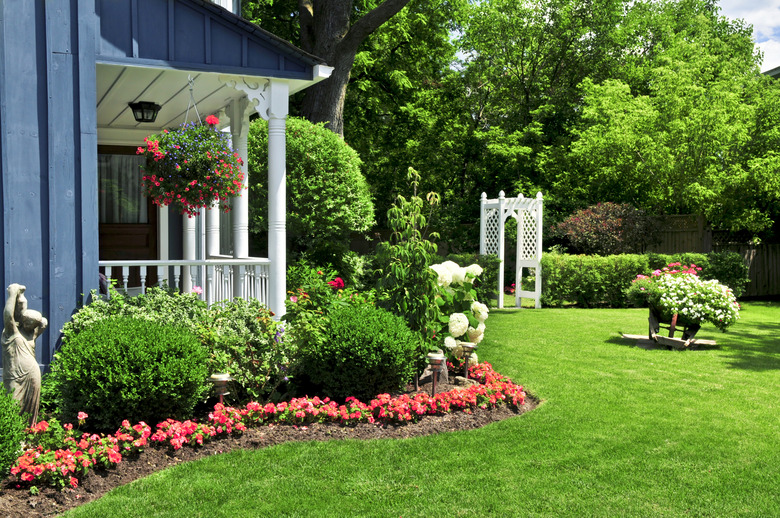How To Build A Planting Bed Against A House
A planting bed against your house hides the foundation for better curb appeal. The plantings can also accentuate your home's front entrance and the overall architecture. However, planting near your home's foundation takes careful planning to give the plants enough room and to protect your foundation.
Decide on the Size
Planting beds against the house typically run along the front of the house and may curve around to the sides as well. Decide where you want to have your planting bed to help better plan what you'll put there. For a planting bed along a house, a width of 6 feet to 8 feet creates an attractive design and gives you plenty of room for some larger shrubs or small trees. The things you plant also have more room to grow with this amount of space.
When choosing plants and planning the size and layout, consider the spacing between your foundation and the plants. Leave a minimum of 1 foot between the plants and the foundation to give them room to grow. Planting them too close to the house can cause foundation issues and restrict the growth of the plants, especially shrubs, which might grow on only one side instead of developing into full, healthy shrubs.
Plan Your Plants
Before you buy plants for your foundation garden, consider the look you're trying to achieve, what types of plants you want, and the growing conditions in the area. To thrive, the plants need to work with the amount of sunlight that the area receives. Also, consider the style of your home to choose plants that work with it.
Planting beds look best with a mix of heights and plant types for variety. Choose plants that offer something to look at year-round, such as evergreen shrubs that add color in the winter along with a mix of perennials that bloom at various times. Consider taller plants at the corners of your home, which can help soften the harsh corners, anchor the planting bed, and make a small house appear larger.
Clear the Area
With the size and layout of the garden decided, you can clear the area. If you currently have any foundation plantings that you don't want to keep, such as shrubs, remove them from the area. Dig up the sod to reveal the soil and work it with a tiller or garden fork to loosen it. Work 2 to 3 inches of compost into the soil to improve the soil structure and give your plants the nutrients they need to thrive.
Check the Slope
When building your planting bed, be aware of the slope of the soil. It should slope away from your home's foundation to avoid collecting water along the base of your house. A general guideline is to have the ground drop 9 to 10 inches over the 10 feet leading away from your home.
Edge the Planting Bed
Installing planting bed edging around the landscaped area helps finish it and helps keep the bed from washing into the yard. It's also important to apply mulch to the planting bed to help retain the moisture in the soil. When soil dries out, it can cause movement in the foundation, which can cause foundation damage you need to repair.
